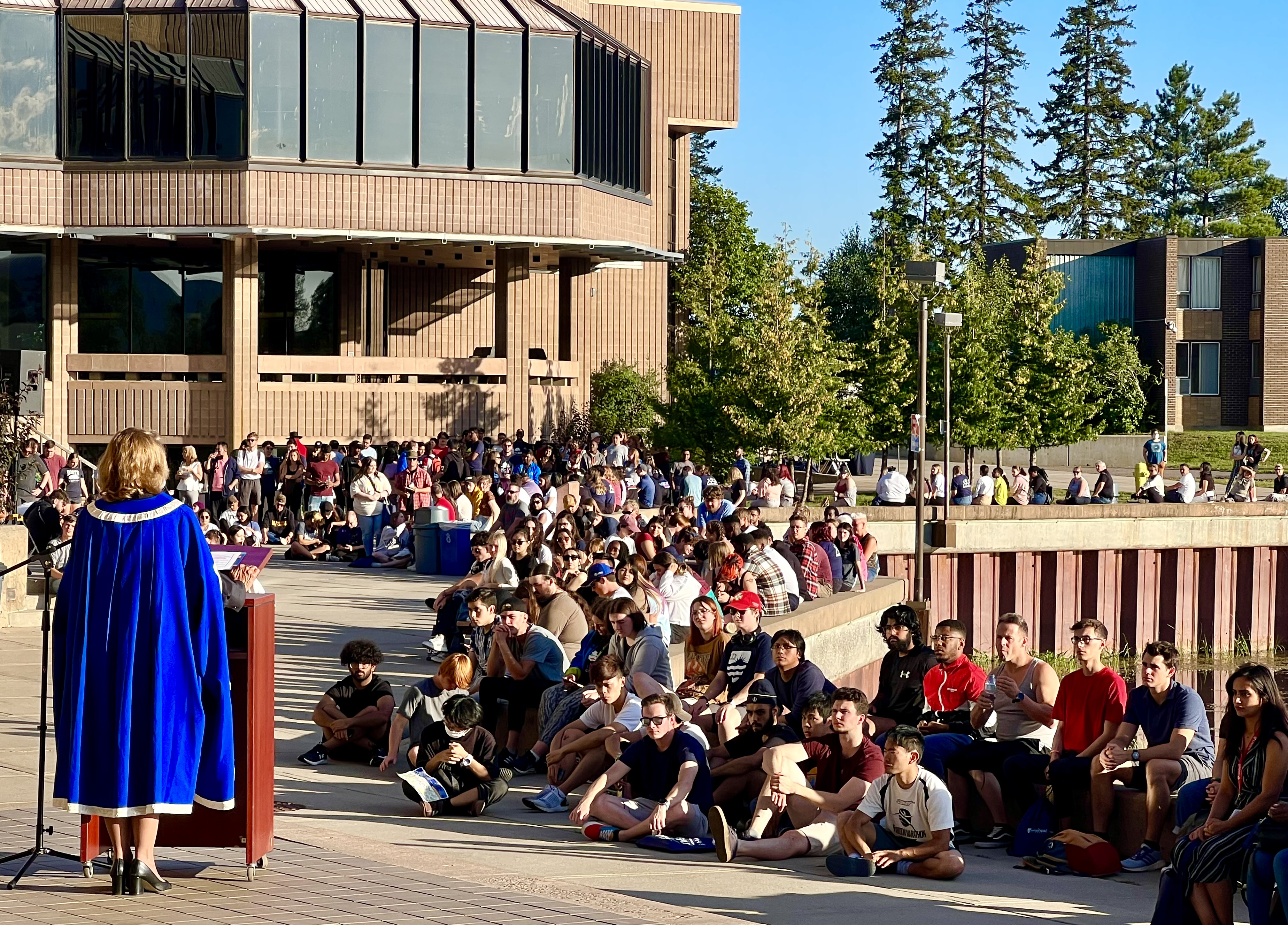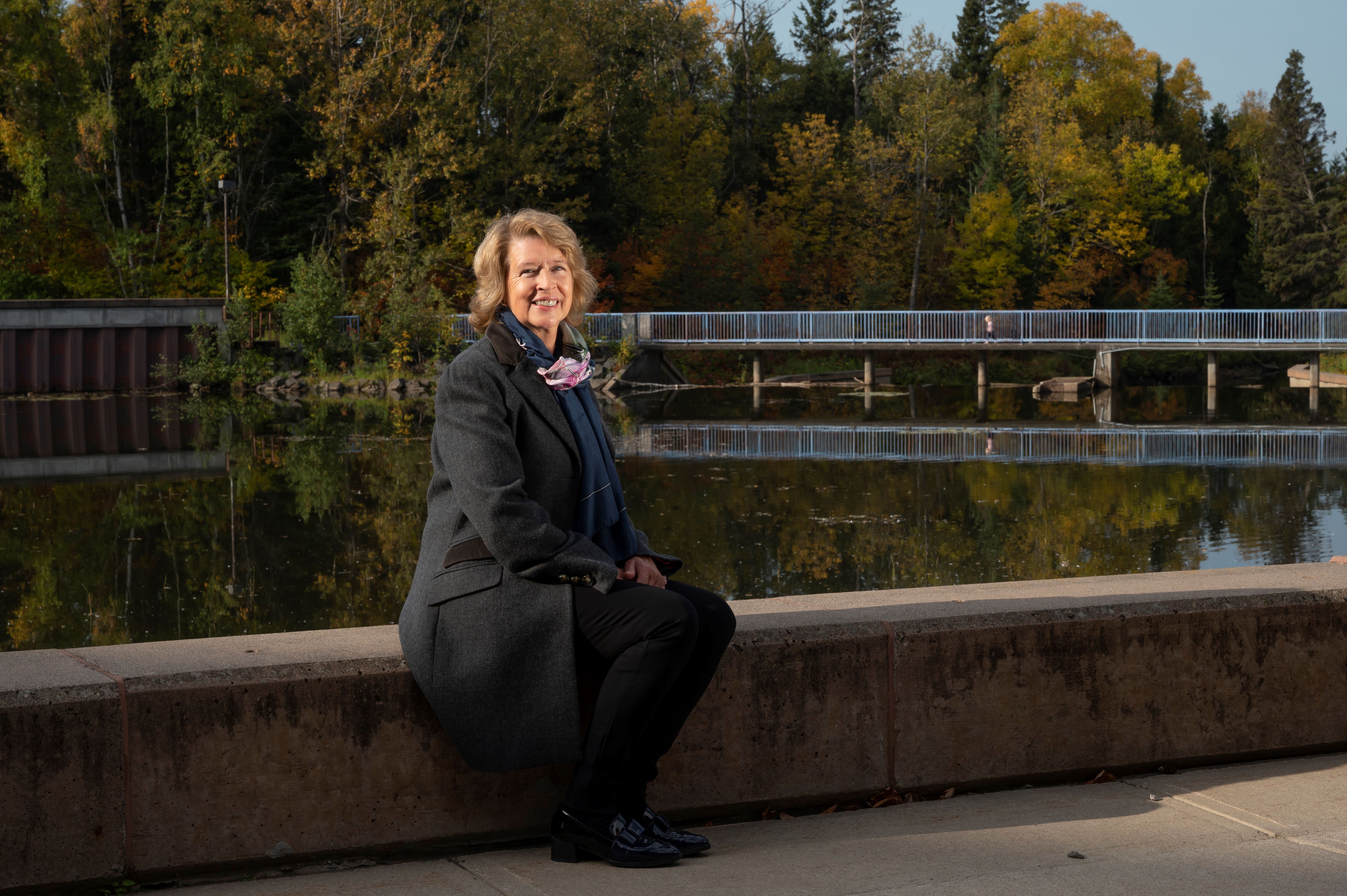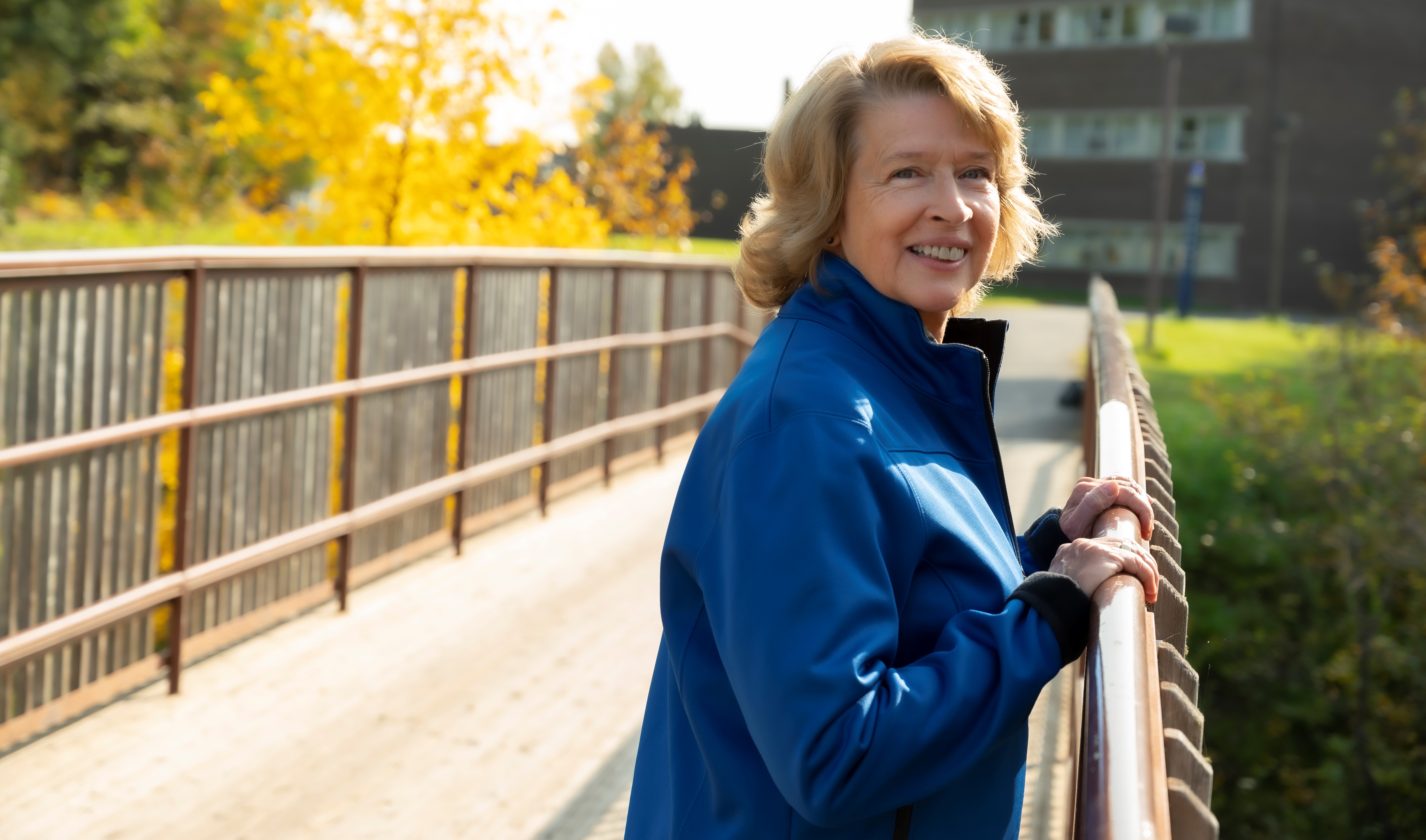As our University community prepares to bid farewell Dr. Moira McPherson—its seventh and first female President and Vice-Chancellor—on June 30, 2023, Journey staff invited her to share her reflections on her term as President and her time in multiple senior leadership positions at Lakehead.
Dr. McPherson, President and Vice-Chancellor
In the summer of 2017, I was deeply honoured when Lakehead's Board of Governors offered me the opportunity to serve as our University's Interim President and Vice-Chancellor. Since that moment in September 2017, and my subsequent appointment as Lakehead's President a year later, it has been a privilege to work with the many talented and exceptional people at our institution's two campuses and to help lead us through some of our most tumultuous years together.
My decision to accept this role followed more than a decade of serving in multiple senior leadership roles at Lakehead during which I gained a thorough understanding of our University's complex operations and learned from others in universities and communities across the country and around the globe. I had already worked with many areas of the University and with regional, national, and international organizations, and knew there were key opportunities to build on and integrate our unique strengths so that Lakehead could flourish during a time when there was an accelerated pace of change and challenges facing all universities. Taking on the role of President seemed like the next step to continue my efforts to further strengthen Lakehead's potential.
While it seems like long ago, my previous roles as Lakehead's Deputy Provost, and then Provost & Vice-President (Academic), definitely helped prepare, shape, and advance my vision for what would be my term as President.
Building on Previous Roles to Shape and Advance a Vision for Lakehead
In 2011, I was appointed to the Deputy Provost position. In that role, I worked across our various faculties and offices to lead the University’s transition to the newly provincially mandated Quality Assurance Framework, building on our many program strengths and our growing reputation as a comprehensive university. This was foundational work that is still guiding our program innovation and quality assurance.
When I was appointed Provost & Vice-President (Academic) in 2014, I was made responsible for leading academic affairs for Lakehead University’s nine faculties and our approximately 8,500 students, 550 instructional faculty, 42 academic units, two campuses, and more than 30 graduate programs at the time—a formidable and richly rewarding task to be sure!
During my term as Provost, I led the creation and expansion of academic programs, innovative learning opportunities, and the integration of research throughout the undergraduate curriculum. Our teams forged new and productive pathways and relationships with our college partners to expand student success and access while maintaining high academic quality and fiscal sustainability. I was proud to be charged with the responsibility to write and lead the development of the final Bora Laskin Faculty of Law degree curriculum proposal and was able to shepherd the proposal through the provincial Quality Assurance and Law Society approval processes. Its special mandate was designed to suit the needs of our northern communities in ways unique to Lakehead, and the graduates of the program continue to excel throughout Northern Ontario, the province and, more broadly, across the country.
After a decade of working with the Senate Teaching and Learning Committee and supporting instructional development, I launched a Provost’s Task Force on Innovation and Excellence in Teaching, Learning and Technology. The Task Force was asked to recommend institutional changes to organizational structure and infrastructure, and policy and resource requirements to lay the groundwork for the development of an advanced teaching, technology and learning centre. I used their comprehensive report to inform the launch and official opening of the Teaching Commons during the 2017-2018 academic year.
Dr. David Barnett, Provost & Vice-President (Academic), and his team subsequently developed and led the operations of the Teaching Commons, which provided a strong foundation when the global pandemic hit and we had to immediately migrate all in-person classes to a sustainable online and delivery model. The Teaching Commons played a timely and critical role in helping faculty and instructors pivot quickly to online teaching modes and it is currently addressing the evolving needs of faculty, instructors, and our graduate student instructors.
What sets Lakehead apart?
 Dr. McPherson (centre) with Thunder Bay elementary students enrolled in Lakehead's Achievement Program, which helps youngsters overcome socioeconomic barriers to postsecondary education.
Dr. McPherson (centre) with Thunder Bay elementary students enrolled in Lakehead's Achievement Program, which helps youngsters overcome socioeconomic barriers to postsecondary education.
Lakehead has grown to be the preeminent comprehensive and research-intensive university in Northern Ontario. Along with our growing campus in Orillia, we play a distinctive role in Ontario's postsecondary sector with our emphasis on access and our commitment to Indigenous learners and their communities.
Ninety-five per cent of Lakehead's students face at least one barrier to postsecondary education and both of our campuses are located in regions with the lowest postsecondary participation rates in the province. At the same time, Northwestern Ontario has seen declines in the number of traditional university-age students—compelling us to work harder and smarter to expand our reach and programming to meet both enrolment goals and our regional mandates.
Our University has a solid history of responding effectively to student demand and societal needs. It has flourished by transforming higher education challenges and inequities in Northwestern Ontario, Simcoe County, and surrounding regions into rich student experiences linking learners, programs, scholars, and communities.
Lakehead has gained new strengths and a higher profile despite the incredibly challenging odds over the past five years. We have worked hard to build strong relationships with Indigenous and community leaders, industry, government, and international partners. We have focused on creating a richer and more diverse Lakehead and have improved graduation outcomes for Indigenous and international students. Our progress has only been possible because of the passionate efforts of our internal administrators, faculty, and staff who believe, as I do, in Lakehead's ability to transform student's lives, as well as the communities we serve.
Lakehead Versus COVID
I have really been reflecting on this a lot recently.
Although there were some distinct phases as the global pandemic gripped and changed the world for all of us over the past three years, each of us experienced its effects and time in dramatically different ways.
I recall the intense pressure of working with my team to constantly respond to the danger and uncertainty of the pandemic and to the rapidly evolving public policies regarding physical-space requirements, residence and food services, isolation protocols, changing learning and support deliveries, mask and mandatory vaccine policies, etcetera. It was an exhausting challenge that consumed us 24/7 as we had to be on top of the tidal waves of changes we confronted daily as the weeks and months wore on. We received and issued updates as ministry, federal, and provincial health mandates changed in what seemed, at first, to be every few hours. We issued a barrage of communications, held town halls, and hosted endless virtual meetings. For weeks, and then months, we needed to create detailed weekly financial, enrolment, budget, and resourcing scenarios to prepare Lakehead for any possible eventuality. We knew we faced a vast number of unknowns as the pandemic coursed through the country.
It was beyond grueling, but with everyone's constant attention, we kept students, faculty, and staff safe on our campuses. Lakehead was one of only a handful of Ontario universities that did not have campus COVID outbreaks. Our students were provided with the necessary support services, significant emergency funding, and other resources, and throughout there was continuity of academic delivery and business operations.
Three years later, we are still dealing with the impacts of the pandemic on our University. One of the hardest to address is building back an engaged 'on-campus' culture. Students and employees alike have suffered in many ways, and many have come back shaped by having lived through the global pandemic. We will continue to invest as much as we can to build the health and wellness supports for our students and employees, however, I believe there are limits to how much universities can do alone. We have to accept that it will take individual efforts and a multitude of other types of supports outside of the University's scope, as well as time, to recover in a world that has been so profoundly altered.
Proudest Moments

An overarching theme of Lakehead's 2018-2023 Strategic Plan was to enhance our role in creating future leaders and to continue to engage in positive relationships with the communities surrounding our campuses.
At the start of my term as President, I was fully focused on the development and implementation of our 2018-2023 Strategic Plan and the subsequent development of a suite of core foundational plans, including our Academic Plan, Research Plan, our Equity, Diversity, and Inclusion Plan, the Orillia Campus Outlook, and our Wellness Strategy—Our Trail to Wellness.
The Strategic Plan, and each subsequent foundational plan, guided an integrated effort to successfully achieve our ambitious goals and targets even while facing funding shortfalls and harmful pandemic setbacks.
While focus and effort must continue, Lakehead has dramatically increased its responsiveness to the needs and aspirations of Indigenous learners, focusing on Indigenous knowledge, culture, and values, and highlighting the profile and success of Indigenous learners and colleagues at the University. Supported by key members of the President's Council on Truth and Reconciliation (PCTR), we have developed partners in some wonderful new initiatives, providing global experience and internship opportunities to Indigenous learners such as the OpenText initiative. Lakehead and the Seven Generations Education Institute are partnering to deliver programs including the All Nation Nurses Entry Program and the Bachelor of Nursing program in communities throughout Northwestern Ontario, enabling students to pursue their chosen programs in their home communities. The Niijii Indigenous Mentorship Program delivered educational programming, hands-on experience, and pathway guidance to more than 5,500 Indigenous youth throughout Northwestern Ontario over the last year. Our faculty and researchers are doing critical work to address improved access to health care, language preservation and revitalization, and in many other areas in partnership with Indigenous organizations.
My proudest moments in more recent years are also defined by, and due to, the ongoing opportunities to work with the dedicated, hard-working professionals around me.
As I approach the end of this presidential term, I am acutely aware of how important my collaborations with Kathy Pozihun, Vice-President (Administration & Finance), and Dr. Heather Murchison, Vice-Provost (Institutional Planning & Analysis) and Strategic Advisor to the President, were as we customized an integrated planning and budgeting process for Lakehead.
In 2017, we fully framed and launched the process, greatly expanding the University's capacity to set and define objectives that have supported the realization of our strategic goals, despite tightly constrained provincial grants and a challenging fiscal environment. Our planning processes have been recognized as a "best practice" by the Society of College and University Planners. Quite frankly, we could not have remained financially sustainable over the past years and still advanced our priorities without this approach.
I worked closely with Dr. Andrew Dean, Vice-President (Research & Innovation), to ensure our faculty have the capacity to develop their research programs. The number of graduate students at Lakehead has increased, we now offer more research-based learning experiences for undergraduates, and Lakehead researchers are being recognized internationally. Lakehead has significantly advanced its total research funding and reputation through new high-impact research centres, such as the Biorefining Research Institute, EPID@Work, and the Anishinaabe Kendaasiwin Institute.
Once again, this year, Lakehead was ranked first in Canada for not-for-profit research income in our peer category by Re$earch InfoSource. Lakehead is now also known for its strengths in community-based research, making a real difference to the people in our regions.
I am also pleased with the progress we have made through the work of the President's Advisory Council on Economic Development (PACED). This group, comprised of business and community leaders from across Simcoe County, has leveraged the County's strengths and ambitions to advance our partnerships with communities, organizations, and local industry. Fueled by our work with PACED, our Orillia and Thunder Bay MOUs, and our local economic development commissions, Lakehead is pursuing the 'Economic Prosperity' designation through the University Economic and Development Association of America. If we receive this designation, we will be only the second university in Canada to do so. During my last month as President, Lakehead will host C2UExpo, the largest research conference ever held at Lakehead, attracting delegates from around the world.
Over the past five years, the intrepid team within Lakehead University International has intensified our international recruitment and retention efforts, ensuring that students arriving from all over the world are welcomed with the services they need to thrive at our University. We invested in both campuses to support global projects, exchanges, partnerships, and the development of cultural competencies and global skills that have enriched the experience of our domestic students and community. Just this past year we signed our first two international dual-degree agreements with the Rennes School of Business in France, and with Northumbria University in the United Kingdom.
We have also continued to grow and expand Lakehead Orillia. This past year we surpassed 2,100 students in our Simcoe County programs, including over 100 international students. Our Vice-President External Relations, along with the Interim Principal of the Orillia campus, are helping us set the stage for a major capital and program expansion on our Orillia campus as we look to the future.
Our administrators and faculty have facilitated the growth of our collaborations with our regional college partners—Barrie's Georgian College and Thunder Bay's Confederation College. The Lakehead-Georgian partnership provides students with opportunities to graduate with an integrated college diploma and university degree, combining the applied knowledge and training of a high-affinity college diploma and the deep education of a university program. Our relationship with Confederation College has been strengthened through new collaborations focused on learner supports and expanding access to postsecondary opportunities. The new Lakehead-Confederation Joint Admissions Agreement reduces barriers to higher education by encouraging students to transition to Lakehead University after they complete their respective diploma program at the College. We've also worked together to enhance wrap-around supports for Indigenous transfer students to ensure that both our institutions understand each student's strengths and provide a network of holistic supports.
Related to finding more ways to provide potential students with opportunities to access postsecondary education and training, we launched the Lakehead Community Zone to support expanded offerings (in person, hybrid, and virtual) in areas related to professional development, certificates, credentials/micro-credentials, badges, community-engaged research, and community-engaged lifelong learning. Over 50 Lakehead micro-credentials are now approved by the Ontario Ministry of Colleges and Universities and are eligible for its Ontario Student Assistance Program.
One of the newest and most exciting projects I have led is the development of a new Collaborative Doctor of Veterinary Medicine Program in Rural and Northern Community Practice with the University of Guelph. Increased veterinary capacity is desperately needed in northern and rural communities and this collaboration will increase the training of veterinarians in Ontario for the first time in a generation. This initiative will also provide an opportunity for Lakehead to further attract and retain local talent in the North for the North. The Government of Ontario recently announced their strong support for a new northern cohort to begin their program each year at Lakehead University and have committed funding towards the necessary training infrastructure at both Lakehead and Guelph. I am so grateful to them for investing in this vision, as well as for the overwhelming support Lakehead has received from the City of Thunder Bay and its Community Economic Development Commission, as well as from external donors and organizations!
Finally, I am deeply proud of the momentum we have collectively built across the University towards a vision for economic, environmental, and social sustainability. In 2022, for the third year in a row, Lakehead was included among the world's top 100 universities in the Times Higher Education Impact Rankings—ranking 64th out of 1,406 universities from around the world based on our performance in meeting the United Nations' 17 Sustainable Development Goals.
This makes Lakehead the highest-ranked university in the world with fewer than 10,000 students.
Our students have also stepped up and are active champions for sustainability in our communities and are leading Lakehead's Sustainability Action Plan.
Closing Thoughts

I have had the good fortune to work with an extremely capable and committed executive team. They have worked together tirelessly to keep Lakehead operating at an incredibly high level during the most challenging time in memory.
I also applaud the efforts and achievements of Lakehead's faculty and staff that have ensured the highest quality of learning and scholarship were maintained despite the most daunting of circumstances.
At the end of the day, we are here first and foremost for our students. I have been able to get to know and celebrate the achievements of so many of our amazing students. They have demonstrated their resilience and spirit over and over, and will, no doubt, contribute so much more to our world and to the communities they find themselves in down the road.
It has truly been a remarkable 5 ½ years to lead and embrace all that is Lakehead as your President!
Individuals are invited to donate to a special tribute fund that has been established to honour Dr. McPherson's leadership and unwavering commitment to Sustainability at Lakehead University.


